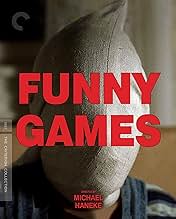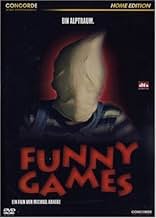Two violent young men take a mother, father, and son hostage in their vacation cabin and force them to play sadistic "games" with one another for their own amusement.Two violent young men take a mother, father, and son hostage in their vacation cabin and force them to play sadistic "games" with one another for their own amusement.Two violent young men take a mother, father, and son hostage in their vacation cabin and force them to play sadistic "games" with one another for their own amusement.
- Awards
- 5 wins & 9 nominations
- Director
- Writer
- All cast & crew
- Production, box office & more at IMDbPro
Storyline
Did you know
- TriviaUlrich Mühe and Susanne Lothar, who play the father and mother, were a couple in real life from this movie until Mühe's death in 2007.
- GoofsWhen Anna and Georg are driving in their car, the reflection of a microphone between the front seats can be seen on the window.
- Crazy creditsThe front credits list "music by" several classical composers and John Zorn. Given the director's outspoken views on modern media, including the "composer" of the hardcore "thrash metal" songs alongside the likes of Handel and Mozart is part of his message.
- ConnectionsFeatured in The Last Days of the Board (1999)
- SoundtracksCara Salva
from 'Atalanta'
Music by George Frideric Handel (as G.F. Händel)
Sung by Beniamino Gigli
Published by EMI DA 1918
Featured review
I think there is a valid argument to make that the universal visceral impact that Funny Games has on audiences undermines the very thesis of its director Michael Haneke. I use the word thesis very deliberately because Funny Games is an intellectual academic statement. Plainly it is not an entertainment movie but I don't consider it to be an art film either. Haneke intended it to be neither in my opinion. I think he intended it as an assault on both Hollywood and the audience. It's the cinematic equivalent of punk. Rock music against rock music. This is an analogy Haneke draws the audience to himself by overriding the classical music Anna and Georg are listening to with some extreme punk music on the sound track. We are left in doubt that the world of Funny Games belongs to Peter and Paul. Anna and Georg and their bourgeois taste in music are treated with utter contempt before Peter and Paul even appear on the screen.
Getting back to my original point: I think there are two parts to Haneke's thesis. The first is that Hollywood has commodified and sanitised violence and turned it into thrilling entertainment. Hollywood violence doesn't show the reality of violence or its consequences on those it is inflicted on. The second part of his thesis is that Hollywood's portrayal of violence has dehumanised and inured the audience and reduced their capacity for empathy and sensitivity. I fully agree with the first part of his thesis. The problem is most people do. I think you would be hard pushed to find any reasonably intelligent, educated person who doesn't agree with Haneke in this regard. Anyone who doesn't isn't going to be enlightened by watching Funny Games. On this point I can't help feeling that he preaching to the converted.
It's the second part of his thesis that he inadvertently undermines. Haneke set out very deliberately to make violence real again so that the audience feels it in their gut. Funny Games isn't real violence though. It's still just a film. However it is a film that manages to make a huge impact on an audience well accustomed to watching violence on the screen. This clearly indicates to me that audiences are smart enough and sensitive enough to be able to tell the difference between Hollywood trite and a convincing portrayal of violence. You could argue that Haneke had to resort to making such an extreme film to have the intended impact on an audience dulled by years of cinematic violence. However Funny Games isn't actually that violent. Compared to the average Arnold Swarzenegger movie it's actually quite tame in both the quantity of violence and how graphically it's portrayed. What makes Funny Games so disturbing is the emotional content in the impact and consequences of the violence on the victims. This is effectively contrasted with the casual approach, understated sadism and emotional shallowness of the perpetrators. If audiences were as lacking in sensitivity as I think Haneke is suggesting then surely Funny Games would have simply have been accepted as another piece of horror entertainment.
Haneke said something along the lines that anyone who stops watching before the end doesn't need Funny Games, anyone who watches it to the end does need it. This strikes me as thoroughly arrogant and is quite wrong in my opinion. Nothing can be implied about anyone who watches it to the end and there is no such thing as a film that an audience needs. Funny Games is a superb piece of cinema and there is no doubt that Haneke was fully successful in what he set out to achieve. However what exactly is it that Haneke thinks that the audience needs from it? As I said earlier most of the audience already understands the point he is making about Hollywood. It seems to me that Haneke is trying to shame the audience into realising how immoral they are for watching violent films. I fundamentally disagree with him if this is his intention. Personally I have no problem with the cartoon violence of Hollywood for the very reason that it is lacking in any real emotional content. It would seem that Haneke not only has a problem with the cartoon violence in films but with actual cartoons. Both Tom and Jerry and Beavis and Butthead are referenced in Funny Games. If Haneke is seriously suggesting that Tom and Jerry cartoons are a moral problem then he is beyond ridiculous.
Having said all this I still give Funny Games a 10 out of 10. Whether we agree with Haneke or not he made us react, think, defend and argue. He also made a truly remarkable film with some of the most heart breaking and profound acting I have ever seen. Funny Games a deeply intelligent film and I don't doubt Haneke's total sincerity and moral integrity. I just don't necessarily agree with him.
Getting back to my original point: I think there are two parts to Haneke's thesis. The first is that Hollywood has commodified and sanitised violence and turned it into thrilling entertainment. Hollywood violence doesn't show the reality of violence or its consequences on those it is inflicted on. The second part of his thesis is that Hollywood's portrayal of violence has dehumanised and inured the audience and reduced their capacity for empathy and sensitivity. I fully agree with the first part of his thesis. The problem is most people do. I think you would be hard pushed to find any reasonably intelligent, educated person who doesn't agree with Haneke in this regard. Anyone who doesn't isn't going to be enlightened by watching Funny Games. On this point I can't help feeling that he preaching to the converted.
It's the second part of his thesis that he inadvertently undermines. Haneke set out very deliberately to make violence real again so that the audience feels it in their gut. Funny Games isn't real violence though. It's still just a film. However it is a film that manages to make a huge impact on an audience well accustomed to watching violence on the screen. This clearly indicates to me that audiences are smart enough and sensitive enough to be able to tell the difference between Hollywood trite and a convincing portrayal of violence. You could argue that Haneke had to resort to making such an extreme film to have the intended impact on an audience dulled by years of cinematic violence. However Funny Games isn't actually that violent. Compared to the average Arnold Swarzenegger movie it's actually quite tame in both the quantity of violence and how graphically it's portrayed. What makes Funny Games so disturbing is the emotional content in the impact and consequences of the violence on the victims. This is effectively contrasted with the casual approach, understated sadism and emotional shallowness of the perpetrators. If audiences were as lacking in sensitivity as I think Haneke is suggesting then surely Funny Games would have simply have been accepted as another piece of horror entertainment.
Haneke said something along the lines that anyone who stops watching before the end doesn't need Funny Games, anyone who watches it to the end does need it. This strikes me as thoroughly arrogant and is quite wrong in my opinion. Nothing can be implied about anyone who watches it to the end and there is no such thing as a film that an audience needs. Funny Games is a superb piece of cinema and there is no doubt that Haneke was fully successful in what he set out to achieve. However what exactly is it that Haneke thinks that the audience needs from it? As I said earlier most of the audience already understands the point he is making about Hollywood. It seems to me that Haneke is trying to shame the audience into realising how immoral they are for watching violent films. I fundamentally disagree with him if this is his intention. Personally I have no problem with the cartoon violence of Hollywood for the very reason that it is lacking in any real emotional content. It would seem that Haneke not only has a problem with the cartoon violence in films but with actual cartoons. Both Tom and Jerry and Beavis and Butthead are referenced in Funny Games. If Haneke is seriously suggesting that Tom and Jerry cartoons are a moral problem then he is beyond ridiculous.
Having said all this I still give Funny Games a 10 out of 10. Whether we agree with Haneke or not he made us react, think, defend and argue. He also made a truly remarkable film with some of the most heart breaking and profound acting I have ever seen. Funny Games a deeply intelligent film and I don't doubt Haneke's total sincerity and moral integrity. I just don't necessarily agree with him.
- graham_525
- Jan 9, 2009
- Permalink
Details
Box office
- Gross worldwide
- $1,266
- Runtime1 hour 48 minutes
- Color
- Sound mix
- Aspect ratio
- 1.85 : 1
Contribute to this page
Suggest an edit or add missing content




























